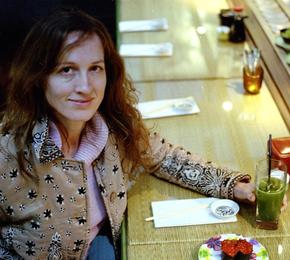 Caroline Bennett's Japanese restaurants, Moshi Moshi and Soseki, have sustainability and environmental stewardship are at their core. Caroline works to make incremental improvement, year after year, at her restaurants; aiming to consistently increase the sustainability of the menu - and setting a standard for other restaurants.
Caroline Bennett's Japanese restaurants, Moshi Moshi and Soseki, have sustainability and environmental stewardship are at their core. Caroline works to make incremental improvement, year after year, at her restaurants; aiming to consistently increase the sustainability of the menu - and setting a standard for other restaurants.
In 2008 Moshi Moshi was one of the first UK restaurants to achieve Marine Stewardship Council Chain of Custody certification and in 2009 she was voted a winner in Seaood Choices' international Seafood Champion Awards.
As well as working in her own restaurants to improve responsibility Caroline has also co-established the Pisces-Responsible Fish Restaurant initiative. Pisces-RFR helps chefs source better quality, more sustainable and more local fish and rewards good fishing practices with better prices for the fishermen. Pisces-RFR fosters direct relationships with independent fishing families, securing their livelihood while at the same time being able to guarantee for the restaurants a strict environmental policy and top quality seafood.
How did you get interested in the issue of sustainable seafood?
I grew up with David Attenborough influencing me to feel that humans are fortunate to be sharing the planet with the other creatures. Nature as he showed it to us was so spectacular, that to feel superior towards it seemed conceited and naïve. So I suppose I was an easy target! Though when I first opened the restaurant I gave no consideration at all to ecological things, which when I look back on it seems odd. It was a summer’s day in 1998 when we first started having difficulties getting supplies of the highly prized ‘ toro’ or belly of the bluefin tuna. It took only a few phone calls to suppliers and NGOs to realise that rather than being just a blip in the supply chain I was witnessing an ecological disaster first hand. Actually, looking back on it, it is amazing to reflect on how thin the veil was between knowing and blissful ignorance…just a few phone calls away!
How would you describe your philosophy on ocean conservation?
Our seas are so majestic, so beautiful, that surely no one should seek to take advantage and profit at the expense of such wonder? But of course in the business world it is very easy to turn a blind eye, and just ‘go with the flow’, believing that the actions of the individual aren’t going to make a difference. Knowing that problems existed, I have subsequently learnt, was just the beginning of the larger problem at hand. Finding solutions has been much harder. We took bluefin tuna off our menus in 1999, and the worry now is that as I familiarise myself with the problems and hear the NGOs’ concerns of the oceans, I fear I should be reducing our menu options to locally grown vegetable sushi! So my philosophy is to make incremental improvement year after year. I won’t introduce anything new to the menu, however deliciously tempting, if I don’t know about its sustainability criteria. Each year my aim is to remove a dish we can find a more sustainable alternative for, maybe through introducing products certified as sustainable by the Marine Stewardship Council for example.
Our main point of differentiation however is that we buy directly from a wonderful fishermen, Chris Bean, based in Cornwall. We met through Slow Food and have never looked back; the quality and freshness of his fish is unrivalled. I still have a couple of embarrassingly unsustainable things on my menu – farmed seabass for example or worse still, intensively farmed Tiger prawns from mangroves in Bangladesh…but when a workable solution presents itself they’ll come off. In my heart of hearts though I know that there is precious little time to waste and that nature won’t be able to put up with our abuse for much longer…
Have your customers noticed?
We do a survey for people joining our members scheme and one of the questions is about our environmental policy. Compared with results from the survey 3-4 years ago our customers rank our policy now much higher, so it seems that increasingly it does matter.
Do you feel it limits what you can offer?
Yes, definitely! There are many items we can’t serve from a Japanese perspective; bluefin tuna and yellow tail are the two most obvious. Eel and fish roes are two more dubious examples. Japanese food is all about fish so it’s not possible to substitute it for a meat or vegetable dish. It means that our chefs have to be super skilled – it’s so much easier to slice a fillet of succulent bluefin that really speaks for itself than to find interesting ways of preparing and serving locally caught white fish, though they have the advantage of being super fresh (and nutritious).
What trends have you noticed in seafood in the past 10 years?
In Japan my friends ate sushi only rarely, in the two months I lived with a Japanese family they ate sushi only twice, once for my farewell party (because they saw I liked it!) and once for granny’s 80th birthday. My friends in the UK however believe you can eat sushi as a substitute for a sandwich three times a week… small wonder our seas are in such a mess.
The other notable change is the size of the big fish, you now see tuna in Billingsgate Market not much longer than 35cm, and weighing less than 30kg; that fish will certainly not have had a chance to breed.
Good Catch: Good Catch provides practical information for chefs, caterers and restaurateurs, making it easier for them to serve more sustainable seafood.
